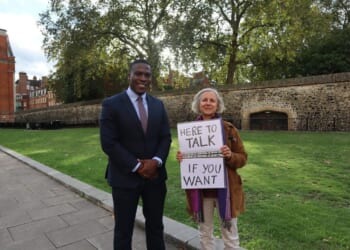
The federal government spent more than $27 million on a nonprofit that texts sexually explicit health advice to children, tells them how to use sex toys and tests them for HIV without notifying or seeking permission from parents.
The Center for Innovative Public Health Research said researchers obtained “waivers” from a review board under the oversight of the Health and Human Services Department to secretly enroll children in government-funded studies of teenage sexual behavior.
Researchers at the center, administering a program on teen pregnancy called “Girls2Girls,” explained they did not want parents to know about their children’s involvement.
“We were granted a waiver of parental permission so that girls who wished to participate would not have to put themselves in a potentially unsafe situation by disclosing their sexual identity to their parents,” Center Director Michele L. Ybarra wrote in a report about the program.
Researchers said the program tested ways to lower pregnancy and sexually transmitted diseases among teenagers as young as 14, through text messaging and to determine if the program “helps teens make healthier choices.”
Teen birth rates are on the decline in the United States, HHS reported. The department cited interventions such as sex education and access to contraception.
But critics say the secret HHS studies, even though aimed at cutting teen pregnancies and sexually transmitted diseases, violate parental rights.
“It’s deeply unethical, and this has been going on for 10 years,” said Hannah Grossman, a researcher and reporter with the Manhattan Institute who uncovered the non-profit’s secret texting program. “Parents are not aware that there are adults texting their children about sex and sex activities. And this has all been funded by the federal government.”
The Girls2Girls study was funded by part of a $4 million grant from HHS. It involved barraging teen girls, mostly between the ages of 14 and 16, with up to 10 daily text messages about how to prevent pregnancy, even if they identify as gay. The texts pressure them to obtain condoms and instruct them how to obtain the emergency contraception “morning-after pill.”
In recruiting for the program through social media and other methods, researchers sought female participants to join “a sex ed program for teen girls who are into girls,” and told prospective participants topics would include how to obtain birth control, “lube” and sex toys and “different types of sex and ways to increase pleasure while decreasing risk for STDs and pregnancy.”
Researchers at the center said there was no need to consult with parents about enrolling their children.
“We have worked closely with our ethical review board to make sure that we have designed a program that best protects the safety of the teens in our program. This includes allowing them to make their own decision about whether to take part in the research and not tell her parents if she does not want to,” researchers explain on the study website’s “frequently asked questions” page.
An ongoing, separate taxpayer-funded project conducted by the center and funded entirely with a $5 million federal grant, targets gay teenage boys as young as 13 with text messages aimed at reducing sexually transmitted diseases, primarily HIV infections.
The texts include instructions on how to use a condom, “complemented with embedded links to interactive demonstrations,” and advice to always use “lube.”
The study, which is actively recruiting underage participants, offers gift cards worth up to $270 to those who join. It requires enrollees ages 13-20 to take a series of HIV tests, also under secrecy and hidden from parents.
The texts also provide information about how the boys can obtain PrEP, a medication taken in pill form or via injection that can stop HIV from spreading. The medication is approved for adolescents but in some instances can cause liver and kidney damage as well as loss of bone density.
Ms. Ybarra wrote in the study guidelines that permission from parents for their teenage boys to participate in the HIV study wasn’t necessary.
“We have obtained a waiver of parental permission for participants under 18 because requiring parental permission could increase risk to participants who may be victimized by their parents because of the need to disclose their sexual minority status,” Ms. Ybarra explained.
Informing parents, she said, would also create a “fatal” selection bias because it would limit the study to children who are “out” to their parents about their sexual preferences.
The study instructs boys to hide the researchers’ text messages from their families and warns them that someone in the home may spot the delivery of HIV testing kits to their doorstep.
“We will send it to another address,” such as an Amazon delivery kiosk, researchers said, “if it is safer for youth … e.g., because a parent may question what is inside.”
Text messages from the study should also be concealed, they told prospective participants.
“It also is important that you receive the program text messages and take the surveys on your own private device – not one you share with others. If your phone is linked to another device like a family-shared tablet, maybe think about being sure that the messages don’t scroll on this other device,” participants are instructed, according to the study consent form.
Neither Ms. Ybarra nor a center representative responded to an inquiry from The Washington Times.
The nonprofit describes itself as a research organization, “dedicated to developing unique technology-based research and health education programs to improve the lives of young people.”
The Girl2Girl study and the HIV study were sponsored by the Office of Adolescent Health, a department within Health and Human Services.
The Center for Innovative Public Health Research has received more than $27 million in federal funding since 2009, most of it through HHS and much of it dedicated to children’s health, teen pregnancy prevention and mental health research.
A $1.2 million grant provided to the center by the National Institute of Mental Health funded a text-messaging-based HIV prevention program for young adults in Uganda. Another government grant provided to the center, totaling $1.3 million is funding an ongoing teen pregnancy program for transgender boys.
An HHS spokesperson did not respond to an inquiry from The Times about the programs or about its decision to provide waivers that leave parents in the dark.
According to the HHS Office of Human Research Protections, an “Institutional Review Board may waive the requirements for obtaining parental or guardian permission,” under certain circumstances, such as in the case of abused or neglected children.
The U.S. Government Accountability Office found that HHS oversees 2,300 U.S.-based Institutional Review Boards that are mostly based at universities. A 2023 GAO study found neither the FDA nor the Office of Human Research Protections has conducted an assessment of their oversight of the review boards “to help ensure they inspect enough IRBs annually and to optimize their responsibility in protecting human subjects.” Neither agency, the GAO found, has “assessed to what extent IRB reviews are effective in protecting human subjects.”
In a summary of the HIV study grant, researchers said the study will “harness the power of text messaging” to reduce HIV risk in gay young males who “face disparate risk” for acquiring HIV, particularly among Black, Hispanic and rural populations.
The Centers for Disease Control reported in 2022 that the largest number of new HIV infections, nearly 40%, occurred among people aged 25-34, and those aged 13 to 24 accounted for 20% of new HIV infections.
The annual number of HIV infections among people aged 13 to 24 decreased 30% from 2018 to 2022.
The CDC recommends that everyone aged 13-64 get tested for HIV “at least once,” as part of routine health care.


![NYC Tourist Helicopter Falls into Hudson River, Siemens Executive and Family Among Those Killed [WATCH]](https://www.right2024.com/wp-content/uploads/2025/04/NYC-Tourist-Helicopter-Falls-into-Hudson-River-Siemens-Executive-and-350x250.jpg)






![Red Sox Fan Makes the ‘Catch of the Day’ with Unconventional ‘Glove’ [WATCH]](https://www.right2024.com/wp-content/uploads/2025/04/Red-Sox-Fan-Makes-the-‘Catch-of-the-Day-with-350x250.jpg)
![Green Day’s Cringe Trump Diss Ends in Fire and Evacuation [WATCH]](https://www.right2024.com/wp-content/uploads/2025/04/Green-Days-Cringe-Trump-Diss-Ends-in-Fire-and-Evacuation-350x250.jpg)






